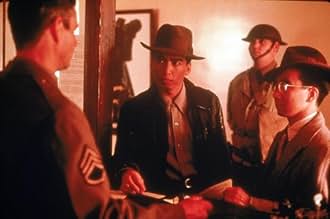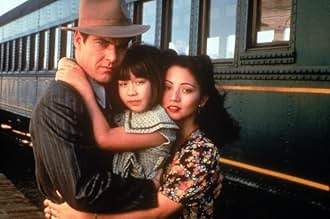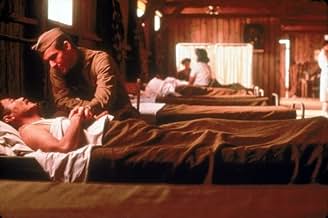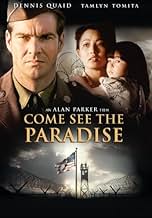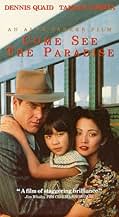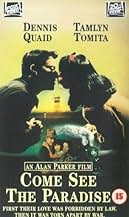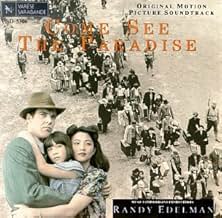Durante a Segunda Guerra, um soldado se casa com uma japonesa. Depois do ataque a Pearl Harbor, os descendentes de japoneses são acusados de traição e enviados a um campo de concentração, in... Ler tudoDurante a Segunda Guerra, um soldado se casa com uma japonesa. Depois do ataque a Pearl Harbor, os descendentes de japoneses são acusados de traição e enviados a um campo de concentração, incluindo sua esposa e a filhaDurante a Segunda Guerra, um soldado se casa com uma japonesa. Depois do ataque a Pearl Harbor, os descendentes de japoneses são acusados de traição e enviados a um campo de concentração, incluindo sua esposa e a filha
- Direção
- Roteirista
- Artistas
- Prêmios
- 3 indicações no total
Avaliações em destaque
Dennis Quaid and Tamlyn Tomita play the romantic interest of the picture, Quaid playing a regular Joe who comes to work at a movie theater in Little Tokyo, meets the boss's daughter played by Tomita, and soon they fall for each other quite deeply. But as it's forbidden by the girl's father, they still try and sneak away anyway to have their love. Then come the internment camps, the camps created as a homegrown quasi concentration camp for the Japanese, where in Lily is once again with her family, away from her great love. It isn't exactly the most sunny of entertainments, and Alan Parker's writing is nowhere near the level of finesse and maturity his direction has, but there could be a lot worse as far as bludgeoning-over-the-head movie-making. I can also see, from my recollection, that it is understandably one of the least seen of Parker's films.
Like many films, "Come See The Paradise" is about the strength of love. The fact that it uses this period as a backdrop sets it apart from the rest. The chemistry between Quaid and Tomita is amazing. Just watch them together when they meet for the first time and they kiss. It's simply stunning. Quaid has rarely been this good, and Tomita is obviously relishing having a lead role. In most of her films she's listed as "(somebody's) wife". Films like this and "The Joy Luck Club" prove that she is one of the most talented and under-used actresses.
Some have complained that this film uses an "American" character to tell the story of a "Japanese" family. As if any non-Japanese audience members would not be able to understand, or relate to, the Japanese family. The Quaid character is called "un-American" because of his labor rights stance. The family is called "un-American" simply because they are of Japanese descent. Even though the children were born in the United States. So what exactly does it mean to be "un-American"?
Side note: this movie has not been released on DVD. I anxiously await that day.
The movie moves deliberately. It takes its time to show the cultural differences and give the romance some space. It's a bit slow but it works as an old fashion romantic film. It doesn't really heighten the drama more than a simple melodrama level. The running time is over two hours long and probably would work better with less. This starts as a fine love story about Jack and Lily but that drama fades into the background in the second half. The camp part of the movie becomes more about telling different aspects of life through the family members.
Você sabia?
- CuriosidadesThe movie ranks at the No. #1 spot on the top 10 list of most Oscar-bait movies ever made according to research by UCLA sociologists Gabriel Rossman and Oliver Schilke. According to website 'Wikipedia', this movie is "the most deliberate example of Oscar bait in their study of 3,000 films released since 1985. The identification is based on various elements calculated to be likely to draw Oscar nominations, including the previous nominations of [Alan] Parker, the film's setting in Hollywood (including Quaid's projectionist character), and its depiction of a tragic historical event against the background of war and racism. It was only released in a few cities during the last week of that year to make it eligible for the awards. However, it was not nominated for any Oscars and failed at the box office".
- Erros de gravaçãoDuring the destroying Japanese businesses scene, the "I am an American" sign is printed as if from a professional printers, however, it's entirely possible that people had signs professionally printed.
- Citações
[first lines]
Older Mini McGann: Why are we so early?
Lily Yuriko Kawamura: It's good to be early.
Older Mini McGann: Do you ever worry that you won't recognize him, Mama?
Lily Yuriko Kawamura: You recognize me, don't you?
Older Mini McGann: Well, he might have grown a beard or a moustache or something. And I was so little. I only think I remember him. Do you think he'll remember me?
Lily Yuriko Kawamura: Well, he has all your photographs and all the letters you wrote him, and he has all your school reports
Older Mini McGann: You sent him my school reports?
Lily Yuriko Kawamura: Of course I did. I wanted to let him know how well you were doing. Come on, now. I got some tea and rice cakes here. We'll have a nice talk while we're walking, okay? Let's go.
Older Mini McGann: How far do we have to walk?
Lily Yuriko Kawamura: Not far.
Older Mini McGann: If we have so much time, then why are you walking so fast? I shouldn't have worn these new shoes. I think I have a blister. Mama!
[speaks in Japanese]
Lily Yuriko Kawamura: [replies in Japanese] Try not to think about it. You want to look pretty, don't you?
Older Mini McGann: Can we talk about Papa?
Lily Yuriko Kawamura: Okay.
- Cenas durante ou pós-créditosThe 20th Century Fox logo does not have the fanfare on it.
- Trilhas sonorasKawamura Family Theme
Written by Jake Parker and Alan Parker
Principais escolhas
- How long is Come See the Paradise?Fornecido pela Alexa
Detalhes
Bilheteria
- Orçamento
- US$ 17.500.000 (estimativa)
- Faturamento bruto nos EUA e Canadá
- US$ 947.306
- Fim de semana de estreia nos EUA e Canadá
- US$ 65.532
- 25 de dez. de 1990
- Faturamento bruto mundial
- US$ 947.306
- Tempo de duração2 horas 18 minutos
- Cor
- Mixagem de som
- Proporção
- 1.85 : 1
Contribua para esta página



